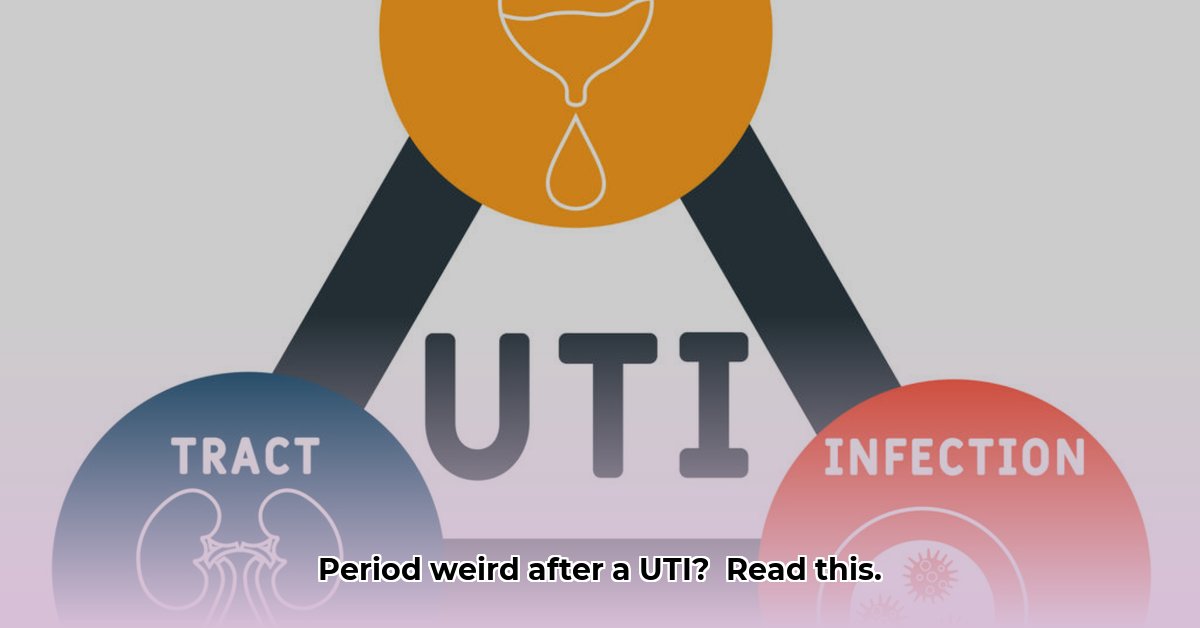The UTI-Period Myth: What’s the Real Story?
It’s a common worry: Could that bladder infection be messing with your period? The short answer is that a urinary tract infection (UTI) doesn’t directly cause a late period. But the story isn’t quite that simple. While UTIs don’t directly impact your menstrual cycle, the stress they cause can indirectly influence its timing. Let’s debunk the myth and explore the science behind this connection.
Separating Urinary and Reproductive Systems
It’s helpful to think of your body as having separate “plumbing” systems. Your urinary system (bladder, urethra, etc.) and reproductive system (uterus, ovaries, etc.) are distinct and function independently. A UTI, an infection in the urinary tract, can’t directly interfere with the timing or flow of your menstrual cycle. It won’t delay it, make it heavier or lighter, or stop it altogether.
The Stress Factor: A Hormonal Cascade
Stress, however, can impact your menstrual cycle. Dealing with the discomfort of a UTI can trigger the release of stress hormones like cortisol. These hormones can disrupt the delicate balance of your menstrual hormones, potentially leading to a slightly delayed period. It’s not the infection itself causing the delay, but rather your body’s response to the stress of the infection. This is especially true if you are prone to stress or anxiety.
Hormonal Shifts and UTI Risk
Interestingly, your menstrual cycle can influence your susceptibility to UTIs. Fluctuations in estrogen levels, particularly the dip that occurs during menstruation, can alter the vaginal environment, making it slightly more conducive to bacterial growth. This doesn’t mean your period causes UTIs, but it might make you a little more vulnerable. Ongoing research explores the intricate relationships between hormones, vaginal flora, and UTI susceptibility.
Spotting a UTI: Key Symptoms
Knowing the signs of a UTI is crucial. Common symptoms include:
- A frequent, urgent need to urinate, even if little comes out
- Burning or pain during urination
- Cloudy or strong-smelling urine
- Pressure or discomfort in the lower pelvis
If you experience any of these symptoms, see a healthcare professional promptly.
When to Seek Medical Advice
If your period is significantly late (more than a week) or you have other symptoms like nausea or breast tenderness, consider taking a pregnancy test. Early pregnancy symptoms can sometimes mimic both UTIs and menstrual changes. Consulting a healthcare professional is always recommended if you have concerns about your period or any other health issues.
UTI Prevention: Proactive Steps
Here are some tips to reduce your risk of UTIs:
- Hydration is Key: Drink plenty of water to flush bacteria from your urinary tract.
- Don’t Hold It: Empty your bladder regularly and completely.
- Hygiene Matters: Wipe from front to back after using the toilet.
- Cranberry’s Potential: Some studies suggest cranberry juice or supplements may help prevent UTIs, but more research is needed.
Easing Discomfort: Home Remedies
While waiting for medical treatment, these home remedies might offer some relief:
- Cranberry Juice: May help prevent bacteria from adhering to the urinary tract lining.
- Heating Pad: Can soothe cramps and discomfort in the lower abdomen.
- Over-the-Counter Pain Relievers: Such as ibuprofen or acetaminophen, can help manage pain and fever.
Key Differences: UTI vs. Period Symptoms
| Symptom | UTI | Period Discomfort |
|---|---|---|
| Pelvic Pain | Sharp, localized | Cramping, more diffuse |
| Urination | Frequent, urgent, painful | Sometimes frequent |
| Urine | Cloudy, strong smell | Typically normal |
| Other Symptoms | Possible fever | Bloating, mood swings |
Understanding the Bigger Picture: Stress, Hormones, and Your Health
This information is for general knowledge and shouldn’t replace professional medical advice. While a UTI doesn’t directly delay your period, the stress it causes can indirectly affect your cycle. Recognizing this empowers you to take charge of your health, practice preventive measures, and seek timely medical attention when needed. Remember, ongoing research continues to explore the fascinating interplay between stress, hormones, and the female body.
- Rectangular Glass Food Storage Containers For Meal Prep - January 27, 2026
- Borosilicate Glass Food Containers Keep Meals Fresh and Organized - January 26, 2026
- Choosing Glass Containers With Snap Lids for Fresh Food Storage - January 25, 2026










